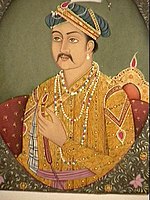Akbar Biography and Works.

The third Mughal Emperor of India, Jalaluddin Muhammad Akbar is known for the rich cultural tradition India enjoys today.
Being forced into exile by the Afghan leader, Sher Shah Suri, Akbar’s father, Emperor Humayun was on the run in 1540 when Akbar was born to him and his wife, Begum Hamida Banu on October 15, 1542, in Sind.
Therefore, Akbar spent most of his childhood running and fighting and hence, couldn’t get any formal education. But, this did not hamper his interest in art, architecture, literature and music.
Humayun recaptured Delhi in 1555. Akbar was entitled to the throne after his sudden death. Akbar took full control as the King in 1560 and died on October 17, 1605.
As an emperor, Akbar conquered the whole of Hindustan (India). He amalgamated the Hindus and Muslims by removing the jizya (tax) that the non-Muslims had to pay.
He married a Rajput princesses, making it possible for the Hindus to be a part of the ruling dynasty.
He banned cow slaughter and allowed the Jesuits to build a church in Agra. He built a place of worship in Fatehpur Sikri where people of all religions were invited.
He held an open court session every week to know about the problems faced by them. His court consisted of a group of ‘nine extraordinary people’ called the Navratnas, meaning ‘nine jewels’.
Ain-i-Akbari and Akbarnama, the two very important historical works, were written by Abul Fazal in Akbar’s honour.
Trivia
Akbar created a new religion called Din-e-Ilahi in 1581, as he believed that one religion did not had the sole authority over truth. The new religion promoted ethics, discouraged sins and held virtues, such as kindness and prudence as its core.
- What is meant by Database Management System?
- Discuss the advantages and drawbacks of database.
- What do you mean by database ? Discuss its Characteristics.
- What is Data Mining?
- What are the conditions of communication?
- What do you mean by business communication ?
- organization / Differentiate between classical and modern theory of organization
- What is forecasting






